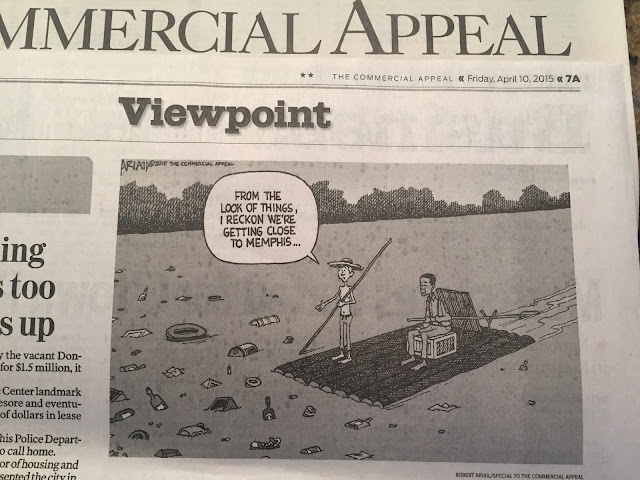Once in a while somebody asks me "Why would you want to paddle on that polluted river?" I think that's the wrong question. The one I want to hear people asking is "Why have we decided it's acceptable for our river to be polluted?"
The lower Mississippi certainly has its share of pollutants, the majority being of the agricultural variety--fertilizers, pesticides, herbicides, stuff like that. The cities and towns in its watershed discharge treated sewage, and of course "treated" can be an elastic term that depends on everything from weather conditions to mechanical problems to administrative and political issues. Then again, the lower Mississippi River is not the fetid open sewer that some people seem to think it is. It's supposed to be muddy: it's carrying the sediment of two-thirds of the continent, continental erosion being part of the never-ending geologic cycle.
The pollutant that's the least possible to ignore is the floating litter. The photo above popped up as a Face Book "memory" yesterday. The cartoon ran in our local paper seven years ago, and it reminded me of one of the more mendacious lines I hear tossed about by our gutless city leaders in both the public and private sectors: "We have no control over litter that comes to us from those cities up north."
Having spent thousands of hours paddling my boat on the Memphis riverfront, and I am quite sure that over 95% of the litter in the water originates in the greater Memphis area. Go down to the river after a heavy thunderstorm and you'll see trash flowing from the Wolf River, the Loosahatchie River, Nonconnah Creek, and Bayou Gayoso--watersheds that cover all of Shelby County, most of Fayette County, and portions of DeSoto, Marshall, and Benton Counties.
Shortly after the Riverfront Development Corporation, the quasi-governmental organization that manages public properties along the riverfront, completed its signature project, the Beale Street Landing docking facility for the riverboat tourism industry, a local newspaper columnist called attention to the mass of litter that had collected in the area of water between the dock and the riverbank, deeming it a civic embarrassment that resembled a miniature version of the great "island of plastic" that's floating in the Pacific Ocean.
The R.D.C. knew it had to respond. Did it do so by seeking an effective solution to the riverfront litter problem? Oh, heavens no. It placed floating booms at each end of that gap between the dock and the bank, assuring that the litter would just float someplace else. Problem solved. Hey, it was the Riverfront Development Corporation--their job was to build stuff, not care about the health of the river itself. (The R.D.C. has since been re-branded as the Memphis River Parks Partnership, or M.R.P.P., or, as I like to call it, Mr. P.P.)
Of course, it's easy to point fingers at the people in charge, but the biggest finger needs to be pointed at us. Me, you, and every other ordinary citizen. What are we doing to stop litter from escaping into the environment in the first place?
Speaking for nobody but myself, I try to keep my household and workshop garbage contained and pick up as much litter as I can around my neighborhood (I could write many, many paragraphs on nothing but that). But there are further steps than that: I know I need to look hard at what I consume. I practically never drink sodas anymore, so I don't consume many of those plastic bottles, and it's good for my health to boot. I do not buy bottled water; why on Earth would I, when my city happens to have one of the best drinking water sources in the world? Even if that weren't the case, bottled water is often no better than the local tap water. (Yes, I know there are exceptions here and there.) I take my own tote bags to the grocery store so I don't consume the plastic bags they're so eager to give me.
Those are just a few suggestions and I'm under no delusion that I'm superior to anybody else. There are always areas where I could do better.
And... I'm not sure where to take this rant from here. I know it's not what my readers expect from a simple Monday photo feature. I guess I'll wrap it up with this: have some faith that our government institutions can address the problem, demand that they do address the problem, and conduct yourself in a way that doesn't make it any more difficult than it already is for them to do so.
For more information on what this blog is about, click here.



